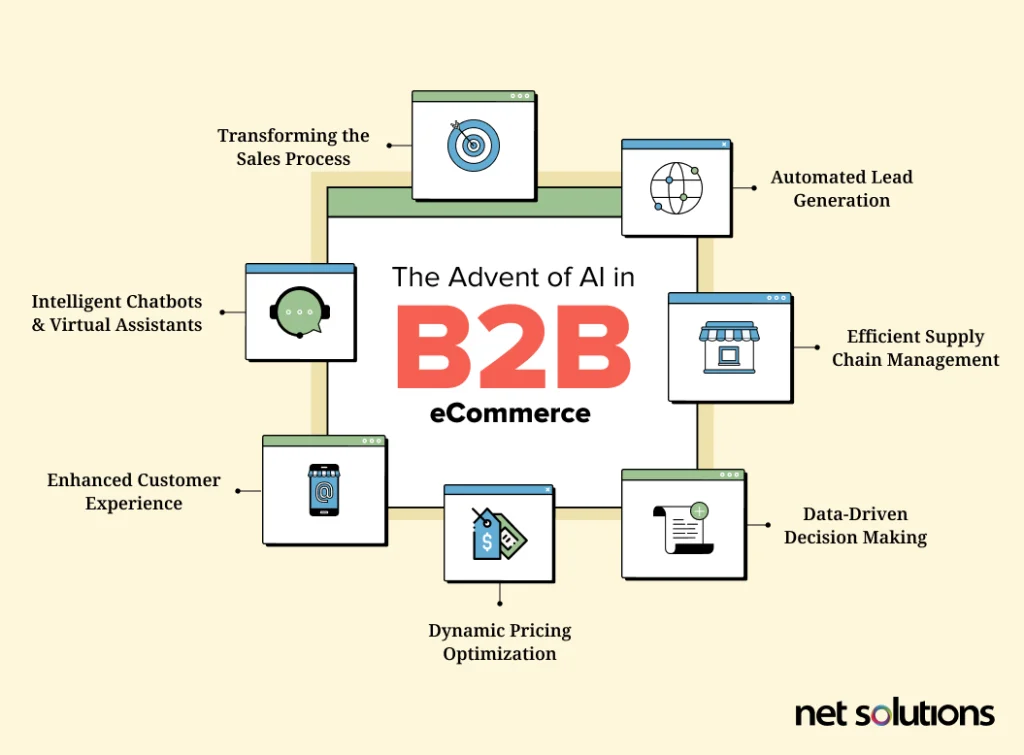The Future of B2B: Utilizing AI Automation to Drive Success
The landscape of B2B is moving as companies increasingly transform to AI automation for critical benefit. This makeover guarantees to improve performance and client involvement through sophisticated technologies. Nonetheless, the assimilation of these devices is not without its difficulties. Recognizing exactly how organizations can browse this developing terrain will be necessary for future success. What variables will determine the performance of AI in this market? The answers might redefine traditional organization versions.
Comprehending AI Automation in B2B
As organizations progressively look for performance, understanding AI automation in B2B ends up being vital. AI Automation For B2B. AI automation refers to the usage of synthetic intelligence technologies to boost and improve service processes. In the B2B sector, this includes the integration of AI tools to manage jobs such as information evaluation, consumer interactions, and supply chain procedures. By leveraging device knowing and natural language handling, business can enhance precision, minimize human mistake, and accelerate decision-making. Furthermore, AI automation facilitates the handling of huge volumes of data, allowing organizations to remove beneficial understandings and optimize their operations. As organizations navigate this technical landscape, a complete grip of AI automation's capabilities will certainly encourage them to remain receptive and affordable to market demands
Secret Advantages of AI Automation for Services
While lots of businesses grapple with raising operational demands, AI automation presents many benefits that can considerably boost their performance. One significant benefit is efficiency; AI systems can do repeated jobs much faster and with greater precision than humans, consequently minimizing mistakes and freeing up staff members for more calculated efforts. Additionally, AI automation makes it possible for data-driven decision-making by evaluating substantial datasets swiftly, giving insights that educate company techniques. Expense reduction is an additional essential benefit, as automation decreases labor costs and enhances resource appropriation. Additionally, AI can enhance scalability, enabling organizations to adjust to market adjustments quickly. Eventually, the combination of AI automation promotes development, enabling firms to stay affordable in a swiftly progressing landscape.
Changing Client Experiences With AI
AI is improving customer experiences by improving and allowing individualized interactions engagement. Via the implementation of anticipating analytics, services can anticipate consumer demands and choices, bring about much more tailored solutions. Furthermore, enhancing assistance procedures with AI technology enhances effectiveness and contentment, ultimately transforming the overall client trip.
Personalized Interactions and Interaction

Predictive Analytics Application
As businesses progressively seek to boost client experiences, implementing predictive analytics has actually become an essential approach in the B2B sector. By leveraging data-driven understandings, companies can prepare for customer demands and choices, allowing them to customize their offerings better. Anticipating analytics utilizes innovative algorithms and historic information to anticipate future actions, permitting companies to identify prospective obstacles and opportunities. This proactive technique not only improves consumer fulfillment yet likewise cultivates commitment by supplying appropriate and prompt options. Additionally, predictive analytics aids in resource allowance, guaranteeing that advertising and marketing efforts are focused on high-value leads. Inevitably, the integration of predictive analytics gears up B2B business with the devices necessary to transform customer interactions and drive long-term success in a progressively competitive landscape.
Improving Assistance Processes
Enhancing customer experiences in the B2B market extends past predictive analytics; simplifying assistance processes plays a crucial duty. By incorporating AI-driven solutions, companies can enhance and automate regular queries feedback times, causing enhanced consumer satisfaction. Chatbots and online aides provide 24/7 assistance, dealing with client requires immediately and reducing the problem on human representatives. This automation enables groups to concentrate on intricate concerns, cultivating more purposeful interactions. Additionally, AI devices can analyze support information to determine fads and areas for enhancement, guaranteeing constant enhancement of solution high quality. Minarik AI. As companies adopt these technologies, they place themselves as receptive and customer-centric, inevitably driving commitment and organization growth in a progressively competitive landscape
Improving Operations and Processes
Enhancing operations and processes in B2B environments is important for improving total efficiency. By enhancing process effectiveness and automating regular tasks, companies can decrease hands-on mistakes and maximize useful resources. This change not only improves efficiency however likewise makes it possible for teams to concentrate on tactical initiatives that drive development.
Maximizing Operations Performance
Enhancing workflow performance is crucial for businesses looking for to enhance and reduce operational expenses performance. By analyzing existing processes, organizations can recognize traffic jams and redundancies that hinder efficiency. Executing streamlined treatments boosts interaction and partnership amongst groups, making sure that tasks are finished extra swiftly. Making use of data-driven insights makes it possible for business to make informed choices that refine operations further. Additionally, taking on incorporated modern technologies can help with seamless info flow, reducing the risk of mistakes and hold-ups. As businesses welcome these modifications, they not only foster a much more nimble workplace yet additionally position themselves to respond quickly to market needs. Ultimately, concentrating on process efficiency allows companies to designate resources effectively, driving lasting success in a significantly competitive landscape.
Automating Routine Tasks
Numerous companies are progressively transforming to automation to manage regular jobs, identifying its possible to substantially improve operational effectiveness. By releasing AI-driven solutions, firms can enhance repetitive tasks such as information entry, billing handling, and consumer questions. This shift not just decreases human mistake but likewise liberates useful employee time, enabling staff to concentrate on critical campaigns and value-added tasks. Additionally, automation can improve reaction times and service consistency, bring about boosted consumer fulfillment. As organizations navigate an affordable landscape, leveraging automation for regular jobs becomes crucial for enhancing workflows and keeping dexterity. Eventually, this approach promotes development and drives development, placing companies for long-lasting success in the advancing B2B setting.
Enhancing Decision-Making With Information Insights
As services navigate an increasingly complex landscape, leveraging information insights ends up being crucial for notified decision-making. Minarik AI. By using ai-driven tools and advanced analytics, companies can change raw information into workable knowledge. This allows them to recognize trends, forecast market modifications, and enhance strategies based on real-time info. Improved decision-making procedures count on data visualization methods, permitting stakeholders to quickly translate complicated datasets and make swift, evidence-based options. In addition, understandings stemmed from customer habits and market dynamics encourage companies to tailor their offerings, improving consumer fulfillment and driving development. Eventually, harnessing information understandings not only boosts decision-making efficacy yet also positions services to continue to be affordable in a swiftly progressing market
Getting Rid Of Challenges in AI Implementation
AI execution holds the assurance of significant functional renovations, companies commonly face a myriad of difficulties that can prevent progression. Secret barriers include information high quality concerns, as many enterprises deal with irregular or incomplete datasets required for effective AI training. Additionally, resistance to change within the labor force can hinder the adoption of AI modern technologies, as employees might fear work displacement or do not have the needed abilities. Budget plan restraints likewise offer a difficulty, restricting financial investment in the required infrastructure and skill. Incorporating AI systems with existing procedures can be complex, requiring considerable time and sources (AI Automation For B2B). Overcoming these difficulties requires a tactical method that includes complete training, modification management, and a dedication to continual improvement in AI initiatives
Future Trends: The Following Frontier in B2B Automation
While the landscape of B2B automation continues to progress, arising patterns are positioned to redefine how companies operate. The assimilation of advanced fabricated knowledge will certainly help with more personalized customer experiences, permitting businesses to tailor options exactly to customer requirements. Furthermore, the increase of anticipating analytics will certainly allow organizations to expect market shifts and enhance decision-making procedures. Automation of routine jobs via robot process automation (RPA) will boost performance, lowering operational prices substantially. Additionally, the adoption of blockchain modern technology guarantees enhanced openness and safety and security in transactions. As these developments gain traction, business will increasingly take advantage of AI-driven insights to foster partnership, simplify supply chains, and improve general performance, noting a transformative shift in the B2B landscape.
Frequently Asked Questions
What Kinds Of Services Can Profit A Lot Of From AI Automation?

How Can Little Services Apply AI Automation Properly?
Small companies can implement AI automation effectively by determining recurring tasks, choosing easy to use tools, guaranteeing ample training for staff members, and slowly integrating services to optimize operations while keeping an eye on performance and adjusting approaches based on comments.
What Prevail False Impressions Regarding AI in B2B?
Usual misunderstandings about AI in B2B consist of the idea that it is just for huge ventures, that it assures immediate results, and that it can fully change human decision-making instead of augmenting it.
Just How Does AI Automation Impact Worker Responsibilities and Work Protection?
AI automation improves employee functions by streamlining repetitive jobs, cultivating performance and innovation. While some anxiety job loss, it frequently develops opportunities for upskilling and brand-new placements, eventually boosting work safety through included value and productivity.
What Skills Are Needed to Handle AI Automation Projects?
To manage AI automation jobs, people need strong analytical abilities, project management expertise, proficiency in information Minarik AI evaluation, understanding of artificial intelligence concepts, effective interaction abilities, and versatility to quickly altering technical atmospheres. These skills guarantee effective implementation.
As organizations significantly seek performance, recognizing AI automation in B2B comes to be necessary. AI automation assists in the handling of big volumes of data, making it possible for businesses to remove useful understandings and enhance their procedures. While several services grapple with boosting operational demands, AI automation presents countless advantages that can noticeably enhance their performance. Automation of routine tasks with robotic procedure automation (RPA) will enhance effectiveness, minimizing operational prices considerably - Minarik AI. Manufacturing, logistics, and customer solution businesses can benefit most from AI automation